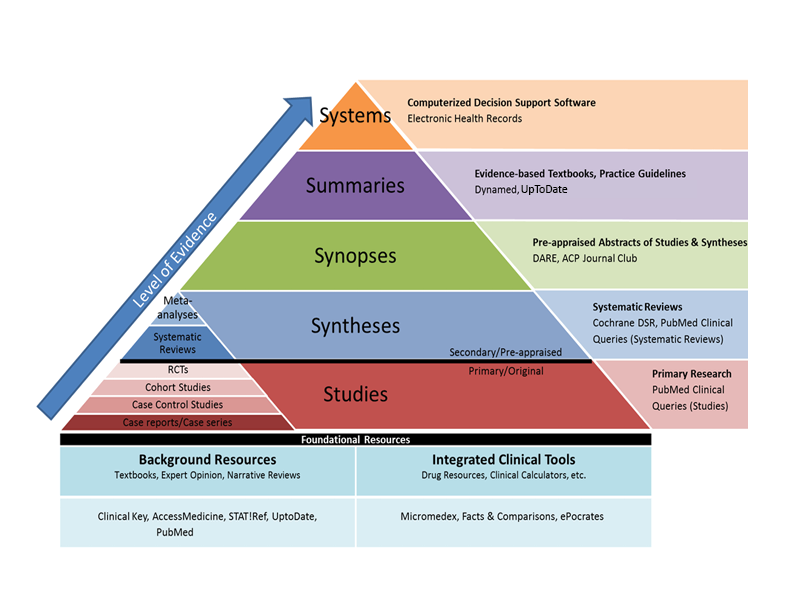
This guide is designed to help students (mainly in Health Sciences, but there are checklist tools for Business and Education students) to understand the purpose and process of critical appraisal, and different methods and frameworks that can be used in different contexts.
Critical appraisal is an essential step in any evidence based process and it is defined by CASP as "the process of assessing and interpreting evidence by systematically considering its validity, results and relevance".
The hierarchy of evidence pyramid below provides a means to visualise the levels of evidence as well as the amount of evidence available. Systematic reviews and meta-analyses are the highest level of evidence therefore they are at the top of the pyramid but they are also the least common because they are based on the studies below them. Moving down the pyramid, the amount of studies increases but the level of evidence decreases. The use of the hierarchy of evidence pyramid is not enough to determine the quality of research because study types can vary in quality whether it is a systematic review or a case study therefore critical appraisal skills are required to evaluate all types of evidence regardless of their level. It is important to apply your own critical appraisal skills when you evaluate research studies to decide if they merit being considered or used as reliable sources of information. Some studies have found that many research findings in published articles may in fact be false (Ioannidis, 2005). In the worst cases, some researchers may commit research fraud to acquire research grants (Harvey, 2020).

Image: Weill Cornell Medicine (2024) Adapted from DiCenso A, Bayley L, Haynes R.B. (2009) 'ACP Journal Club. Editorial: Accessing preappraised evidence: fine-tuning the 5S model into a 6S model'. Annals of Internal Medicine, 151(6), JC3. Available at: https://med.cornell.libguides.com/
Critical appraisal involves using a set of systematic techniques that enable you to evaluate the quality of published research including the research methodology, potential bias, strengths and weaknesses and, ultimately, its trustworthiness. It is often the case that even peer-reviewed research can have methodological flaws, incorrectly interpret data, draw incorrect conclusions or exaggerate findings. Authors' affiliations, funding sources, study design flaws, sample size and potential bias are only some of the factors that can lead you to include poor quality research in your own work if not addressed through critical appraisal.
Critical appraisal often involves the use of checklists to guide you to look out for specific areas in the appraisal process. Checklists vary according to types of research or study designs you are evaluating.
It is important therefore that you possess a good knowledge of research methods in your field of study and a good basic understanding of statistics where statistical analysis is involved.
Please see read What is critical appraisal? and see the resources on this page for further information on critical appraisal.